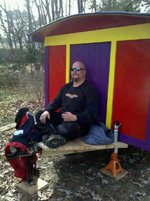mpg
44 posts
• Page 2 of 3 • 1, 2, 3
Re: mpg
Deryk, the 3/8" plywood interior of your trailer is part of the structure and should not be removed. This is what I was told by Lark/Trailershowroom.
I get 18-19 mpg with my 3/4 ton Dodge Diesel at 70 mph unloaded and 12-13 mpg with a 7x16 trailer. I think a Rav4 is too small to tow a 7x14 steel cargo trailer safely under all conditions. Straight line on a level dry road maybe ok but can you control it going too fast through a turn in a stop etc. I have seen a camper roll a mid size suv on a level straight road. From the skid marks it looks like he stopped hard and the camper fishtailed.
I get 18-19 mpg with my 3/4 ton Dodge Diesel at 70 mph unloaded and 12-13 mpg with a 7x16 trailer. I think a Rav4 is too small to tow a 7x14 steel cargo trailer safely under all conditions. Straight line on a level dry road maybe ok but can you control it going too fast through a turn in a stop etc. I have seen a camper roll a mid size suv on a level straight road. From the skid marks it looks like he stopped hard and the camper fishtailed.
- Mark519
- Teardrop Master
- Posts: 103
- Joined: Mon Aug 08, 2011 1:07 pm
- Location: North Georgia
Re: mpg
So is there a difference between a CT and a travel trailer?
Build Thread lil vardo 1: http://tinyurl.com/baqe6py
Build Thread lil vardo 2: http://tinyurl.com/b3rwffm
Build Thread lil vardo 2: http://tinyurl.com/b3rwffm
-

Deryk the Pirate - 500 Club
- Posts: 809
- Images: 158
- Joined: Tue Aug 18, 2009 11:03 am
- Location: Parlin NJ




